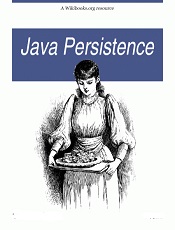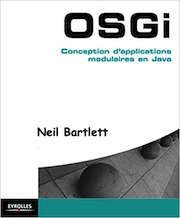
|
FreeComputerBooks.com
Links to Free Computer, Mathematics, Technical Books all over the World
|
|
- Title: Java Persistence
- Author(s) Wikibooks Contributors
- Publisher: Wikibooks (March 18, 2013)
- License(s): CC BY-SA 3.0
- Hardcover/Paperback: N/A
- eBook: HTML and PDF (296 Pages, 3.3 MB)
- Language: English
- ISBN-10: N/A
- ISBN-13: N/A
- Share This:

|
This book is meant to cover Java persistence, that is, storing stuff in the Java programming language to a persistent storage medium.
Specifically using the Java Persistence API (JPA) to store Java objects to relational databases, but I would like it to have a somewhat wider scope than just JPA and concentrate more on general persistence patterns and use cases, after all JPA is just the newest of many failed Java persistence standards, this book should be able to evolve beyond JPA when it is replaced by the next persistence standard. I do not want this to be just a regurgitation of the JPA Spec, nor a User Manual to using one of the JPA products, but more focused on real-world use cases of users and applications trying to make use of JPA (or other Java persistence solution) and the patterns they evolved and pitfalls they made.
This book is intended to be useful for or to anyone learning to, or developing Java applications that require persisting data to a database. It is mainly intended for Java developers intending to persist Java objects through the Java Persistence API (JPA) standard to a relational database. Please don't just read this book, if you're learning or developing with JPA please contribute your experiences to this book.
JPA is a new Java persistence standard based on object-relational mapping and utilizing object-oriented features of Java. It is expected to gradually replace JDBC and proprietary object-relational mapping frameworks/libraries for most Java applications with database access. JPA makes software development fun and leads to improved productivity.
About the Authors- N/A
- Java Enterprise Applications
- Advanced Java Programming
- Introduction to Java Programming
- Java Build, Testing, and Deployment
 Similar Books:
Similar Books:
-
 Guide to Java Persistence and Hibernate (S. Hennebrueder)
Guide to Java Persistence and Hibernate (S. Hennebrueder)
This book is for Java developers who want to learn about Hibernate. It provides a clear introduction to the current standard for object-relational persistence in Java, with more in-depth examples than any other books for Hibernate beginners.
-
 Java Transaction Design Strategies (Mark Richards)
Java Transaction Design Strategies (Mark Richards)
This book is about how to design an effective transaction management strategy using the transaction models provided by Java-based frameworks such as EJB and Spring. Techniques, best practices, and pitfalls with each transaction model will be described.
-
 OSGi In Practice (Neil Bartlett)
OSGi In Practice (Neil Bartlett)
This book is a comprehensive guide to OSGi with two primary goals: first introducing to OSGi concepts with examples, then exploresing numerous practical scenarios and techniques, as well as answering questions.
-
 Docker for Java Developers (Arun Gupta)
Docker for Java Developers (Arun Gupta)
This book introduces basic Docker concepts and explains how to achieve faster startup and deployment of your Java‑based applications, shows how Docker containers can save you many headaches when it comes to packaging, deploying, and scaling your applications.
-
 The Java EE 7 Tutorial (Eric Jendrock, et al)
The Java EE 7 Tutorial (Eric Jendrock, et al)
This book is a task-oriented, example-driven guide to developing enterprise applications for the Java EE 7. Written by members of the Java EE 7 team at Oracle, it provides new and intermediate Java programmers with a deep understanding of the platform.
-
 Dynamic Proxies in Java (Heinz M. Kabutz)
Dynamic Proxies in Java (Heinz M. Kabutz)
Dynamic proxies are such a tool that we can use it to save thousands of lines of repetitive code with a single class. This book is for intermediate to advanced Java programmers who want to get to "guru" status. It is not suitable for beginners in Java.
-
 The Java Web Scraping Handbook (Kevin Sahin)
The Java Web Scraping Handbook (Kevin Sahin)
This book will teach you how to extract data from any website, how to deal with AJAX / Javascript heavy websites, break captchas, deploy your scrapers in the cloud and many other advanced techniques, using Java programming language.
-
 Naked Objects (Richard Pawson, et al)
Naked Objects (Richard Pawson, et al)
The aim of this book is to introduce you to the concept of designing business systems from naked objects, and to enable you to start building such systems using the Naked Objects framework. It outlines a lightweight methodology and provides a short tutorial.





